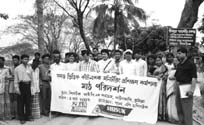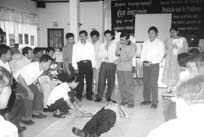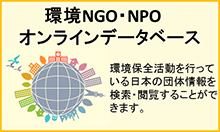

Pesticide Action Network
Examples of Granted Projects
Enlargement of Environmental Conservation Activities among Farmers
(For the Self-Sustainable Development of the Asian Region)
Region) Pesticide Action Network - Asia and the Pacific(PAN/AP)
Executive Director, Sarojeni Rengam
Workshops in Bangladesh and Cambodia

At a workshop in Bangladesh
This year, we held workshops addressing farmers in Cambodia and Bangladesh.Our
objective is to improve the agricultural environment and promote community-
based self-sustainability of farming villages through the systematic monitoring
of pesticides.
Both workshops enjoyed the attendanc e of about thirty participants,
composed mainly of farmers and leaders of local agricultural organizations
and others representing a wide range of fields, including health instructors,
agricultural development and extension officers, national and local government
officers in charge of environmental and health-related issues attended
both workshops. We furthered our understanding of pesticide-inflicted
impacts on health and the environment, integrated pest management and
related policies and regulations, and then developed an action plan.
In Cambodia, NGO's and the United Nations Food and Agriculture Organization's
Integrated Pest Management Group have joined hands to conduct monitoring
programs across the country. In Bangladesh, it was acknowledged that agricultural
and environmental offices and integrated pest management planning offices
in local governments would cooperate with NGO's in promoting pesticide
reduction and environmental conservation activities, and initiating programs
in some villages to deviate from pesticide use. A training manual composed
of four volumes to support community activities was made and translated
into six Asian languages.
Studies and Community Activities Spreading in Various Countries
We have also been actively engaged in research and studies in various countries, as well. In Korea, as part of an environmental agriculture project, we conducted a pesticide residue survey in the river source area near Seoul and launched a campaign to ensure an unpolluted water source. In Bangladesh, we have supported sustainable agriculture practices in seven villages that have integrated fish rearing and farming.
The pesticide used in China amounted to 425 thousand tons in 1999, and dramatically surging, the number is expected to exceed 300 thousand tons in 2005. 100 thousand cases of pesticide poisoning are reported annually, with ten thousand people dying. Given these circumstances, we have teamed up with an organization of academics newly admitted to PAN/AP to initiate studies on impacts inflicted by pesticides and are now making preparations for our first pesticide seminar in China.
Continuation of Pesticide Monitoring Activities
The progress made in seminars and workshops on agricultural impact have steadily been enhanced by local groups in each country. Women farmers in Sri Lanka are leading their village in health monitoring and villagers in the Philippines have taken the initiative in launching a pesticide survey and introducing sustainable agriculture. In China, ecology organizations in Yunnan have begun extensive networking.
PAN/AP has fostered close partnerships with more than forty member organizations.

At a workshop in Cambodia
This is because agricultural, health-related and environmental issues cannot be tackled without the understanding and daily practice of those who actually use the pesticides. We hope to continue to provide, as many resources and technologies as possible to help local movements in various locations.
Contact
Pesticide Action Network - Asia and the Pacific(PAN/AP)
P.O.Box 1170
10850 Penang, Malaysia
TEL: +60-4 6560381
FAX: +60-4 6577445
URL: http://www.poptel.org.uk/panap

Download Adobe Reader
Adobe Reader is required to view Portable Document Format PDF files.
 adobe readerダウンロード
adobe readerダウンロードPDF形式のファイルはadobe readerが必要です。
















